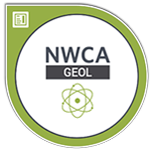PURPOSE
The Geology credential documents the essential competencies required for those assisting in geological careers such as geological technicians, geophysical data technicians, geoscientists, geological engineers, environmental science teachers, geology teachers, and mapping technicians.
AUDIENCE
Individuals that study or apply knowledge of the Earth, rocks, and tools used to measure the Earth’s surface will benefit from this credential. These professionals include Geology teachers, geological technicians, geophysical data technicians, geoscientists, geological engineers, mapping technicians, and environmental scientists.
JOB/CAREER REQUIREMENTS
Core geology knowledge focuses on understanding the Earth, rocks, the processes that change the Earth’s surface, and celestial bodies. The Geology credential documents competencies needed to research and study the physical aspects of the Earth, such as its composition, structure, and processes to learn about the past, present, and future. Those in geology occupations use a wide variety of tools in the field, collect rock samples, and use sophisticated equipment that measures and penetrates the Earth. Those in the field of geology can work in the field and in the lab or even the classroom. Many workers in this field are also involved in the search for and development of natural resources, environmental protection and preservation, reduction of natural hazards, and use seismographs and other instruments to collect data on events such as earthquakes and tsunamis.
GEOLOGY WORKPLACE TASKS:
- Apply geologic principles to civil and environmental engineering.
- Study earthquakes and related phenomena such as floods, tsunamis, and rocks.
- Use principles of physics to learn about the Earth’s surface and interior.
- Trace the evolution of plant and animal life to determine the geologic history of the Earth.
- Assist in projects surrounding environmental cleanup and reduction of natural hazards.
- Explore the Earth for oil and gas deposits.
- Analyze geological information to identify sites that should be explored.
- Collect rock and sediment samples for sites through drilling and other methods.
- Teach courses in environmental science, geology, and astronomy.
EXAM STRUCTURE OVERVIEW
Number of Questions in Exam: 125
Total Time: 90 minutes
Overall Passing Score: 70%
(All sections require an individual passing score of 70%)

